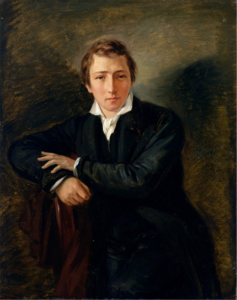Atlas
(Poet's title: Der Atlas)
Set by Schubert:
D 957/8
[August 1828]
Part of 13 Lieder nach Gedichten von Rellstab und Heine (“Schwanengesang”), D 957
Ich unglücksel’ger Atlas, eine Welt,
Die ganze Welt der Schmerzen muss ich tragen,
Ich trage Unerträgliches, und brechen
Will mir das Herz im Leibe.
Du stolzes Herz, du hast es ja gewollt,
Du wolltest glücklich sein, unendlich glücklich,
Oder unendlich elend, stolzes Herz,
Und jetzo bist du elend.
I am miserable Atlas! a world,
I have to bear the whole world of pain,
I bear the unbearable, and my heart wants to break –
My heart wants to break in my body.
You proud heart! actually it is what you wanted,
You wanted to be happy, endlessly happy
Or endlessly suffering, proud heart,
And now you are suffering.
All translations into English that appear on this website, unless otherwise stated, are by Malcolm Wren. You are free to use them on condition that you acknowledge Malcolm Wren as the translator and schubertsong.uk as the source. Unless otherwise stated, the comments and essays that appear after the texts and translations are by Malcolm Wren and are © Copyright.
☙
Themes and images in this text:
Now Iapetus took to wife the neat-ankled maid Clymene, daughter of Ocean, and went up with her into one bed. And she bore him a stout-hearted son, Atlas: also she bore very glorious Menoetius and clever Prometheus, full of various wiles, and scatter-brained Epimetheus who from the first was a mischief to men who eat bread; for it was he who first took of Zeus the woman, the maiden whom he had formed. But Menoetius was outrageous, and farseeing Zeus struck him with a lurid thunderbolt and sent him down to Erebus because of his mad presumption and exceeding pride. And Atlas through hard constraint upholds the wide heaven with unwearying head and arms, standing at the borders of the earth before the clear-voiced Hesperides; for this lot wise Zeus assigned to him. And ready-witted Prometheus he bound with inextricable bonds, cruel chains, and drove a shaft through his middle, and set on him a long-winged eagle, which used to eat his immortal liver; but by night the liver grew as much again everyway as the long-winged bird devoured in the whole day. Hesiod, Theogeny lines 507 - 526 Hesiod. The Homeric Hymns and Homerica with an English Translation by Hugh G. Evelyn-White. Theogony. Cambridge, MA.,Harvard University Press; London, William Heinemann Ltd. 1914.
This passage from Hesiod (c.700 BCE) introduces us to four unlucky brothers: Atlas, Menoetius, Epimetheus and Prometheus. These were all punished by Zeus after the failure of the revolt of the Titans against the rule of the gods of Olympus. There are no details in Hesiod (or other ancient writers) about the exact role that Atlas is supposed to have played in this rebellion, but there is universal agreement that his punishment involved him having to hold up the sky to prevent it falling onto the earth. Most writers agreed that he had to stand at the western edge of the Mediterranean, and in some versions he has been turned to stone (and hence became the Atlas Mountains, overlooking the ocean that still bears his name, the Atlantic). For the ancient Greeks, Atlas held up the celestial globe and turned it on its axis, but later Europeans misinterpreted the image and came to believe that he was holding the earth itself (hence the use of the name ‘atlas’ to refer to maps of the world).
Since Atlas failed to become (or take the place of) a god, we do not have to venerate him. Like us, he has to live with the consequences of his earlier mistaken choices and so we can do so much more – we can sympathise with him. We all know what it is to have to carry a seemingly unbearable burden. At some point in our lives we all feel unhappy or unlucky (‘Ich unglücksel’ger’).
How many of us, though, can manage his form of acceptance? It is so much easier to feel anger, to blame others, to rail against the injustice of it all. Yet Atlas manages to tell himself that this was part of the original wager. It was win all, lose all. Endless bliss or endless misery. He knew what the risks were so there is nobody else to blame. Telling himself this helps him to bear the unbearable.
Do we believe him, though? What is he NOT saying?
☙
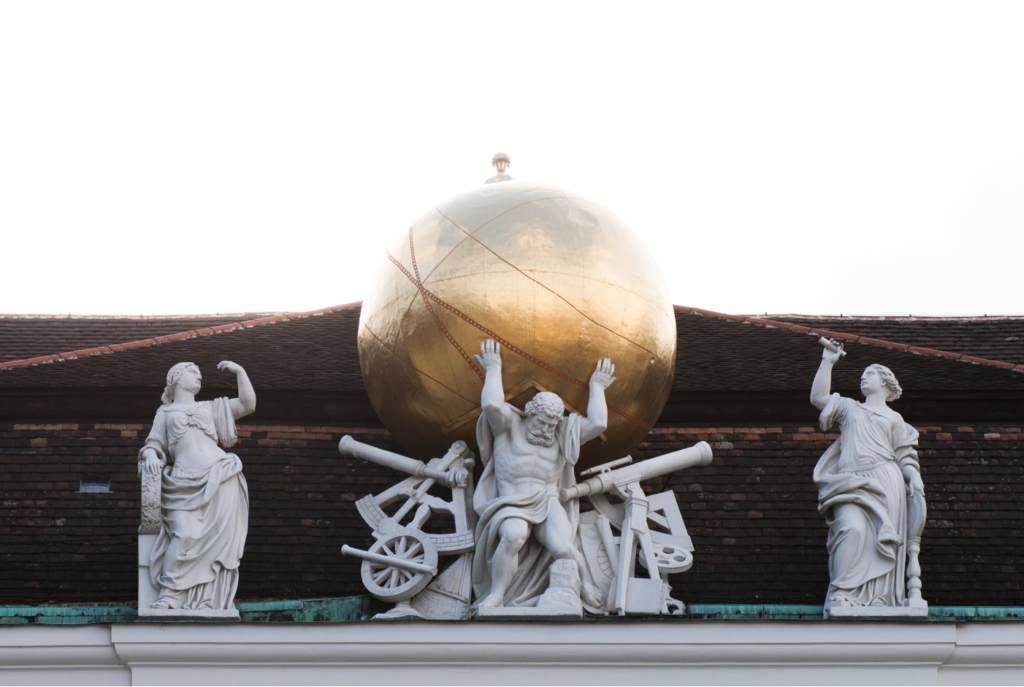
https://commons.wikimedia.org/wiki/File:A_heavy_load_(14026394702).jpg
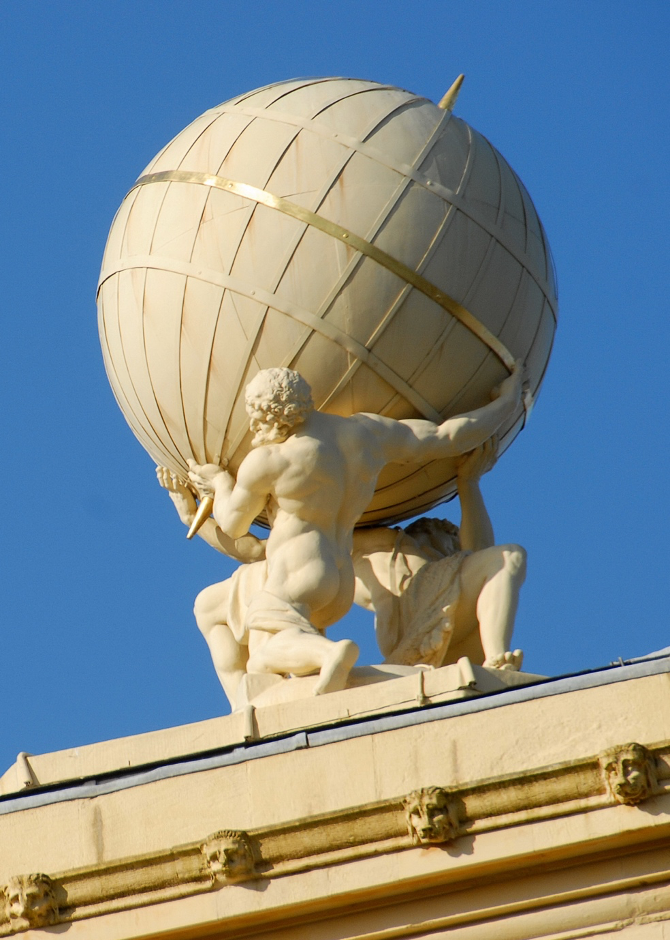
https://commons.wikimedia.org/wiki/File:Top_of_Radcliffe_Observatory,_Green_Templeton_College,_Oxford.JPG
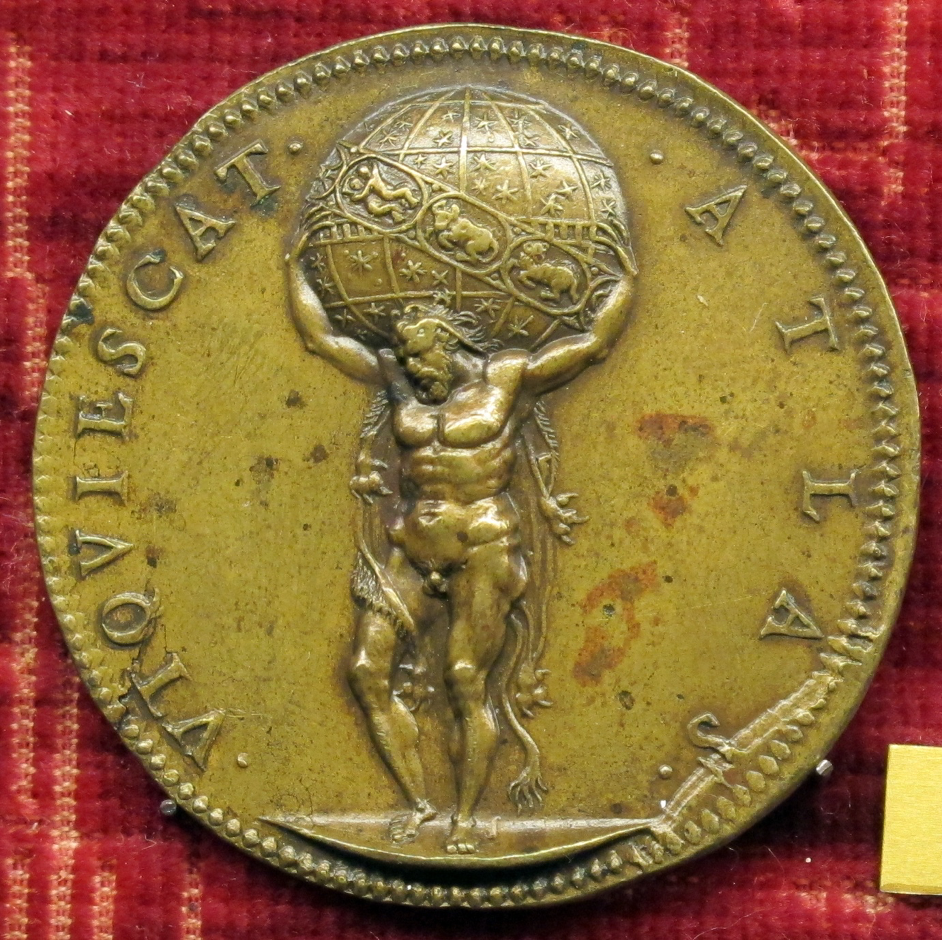
https://commons.wikimedia.org/wiki/File:Giampaolo_poggini,_medaglia_di_filippo_II_di_spagna,_1557,_verso_con_atlante.JPG
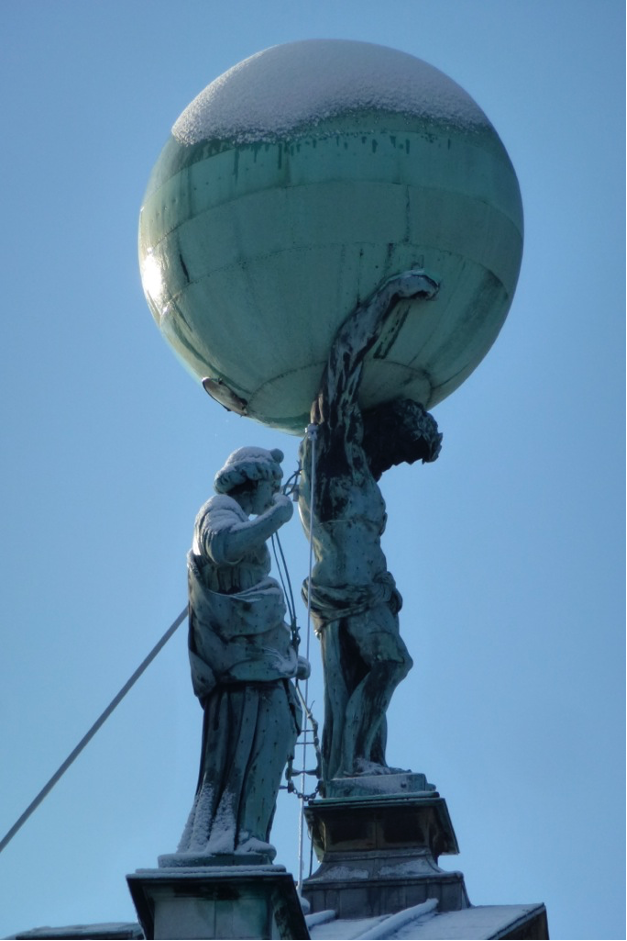
Photo: Malcolm Wren
Original Spelling Der Atlas Ich unglücksel'ger Atlas! eine Welt, Die ganze Welt der Schmerzen muß ich tragen, Ich trage Unerträgliches, und brechen Will mir das Herz im Leibe. Du stolzes Herz! du hast es ja gewollt, Du wolltest glücklich seyn, unendlich glücklich Oder unendlich elend, stolzes Herz, Und jetzo bist du elend.
Confirmed by Peter Rastl with Schubert’s source, Buch der Lieder von H. Heine. Hamburg bei Hoffmann und Campe. 1827, page 202; and with Reisebilder von H. Heine. Erster Theil. Hamburg, bey Hoffmann und Campe. 1826, page 28.
To see an early edition of the text, go to page 202 [208 von 384] here: http://digital.onb.ac.at/OnbViewer/viewer.faces?doc=ABO_%2BZ180399009


